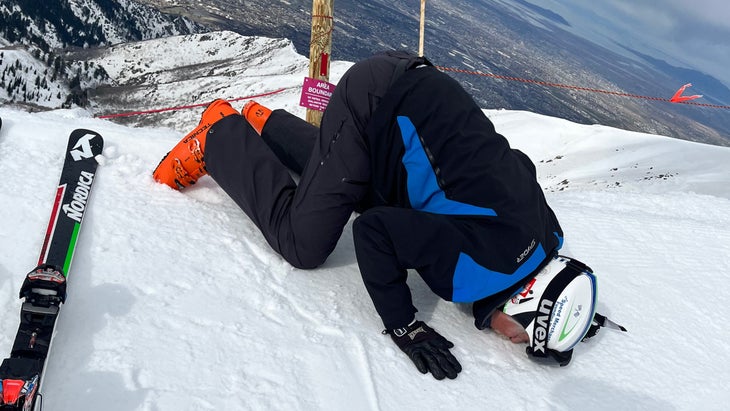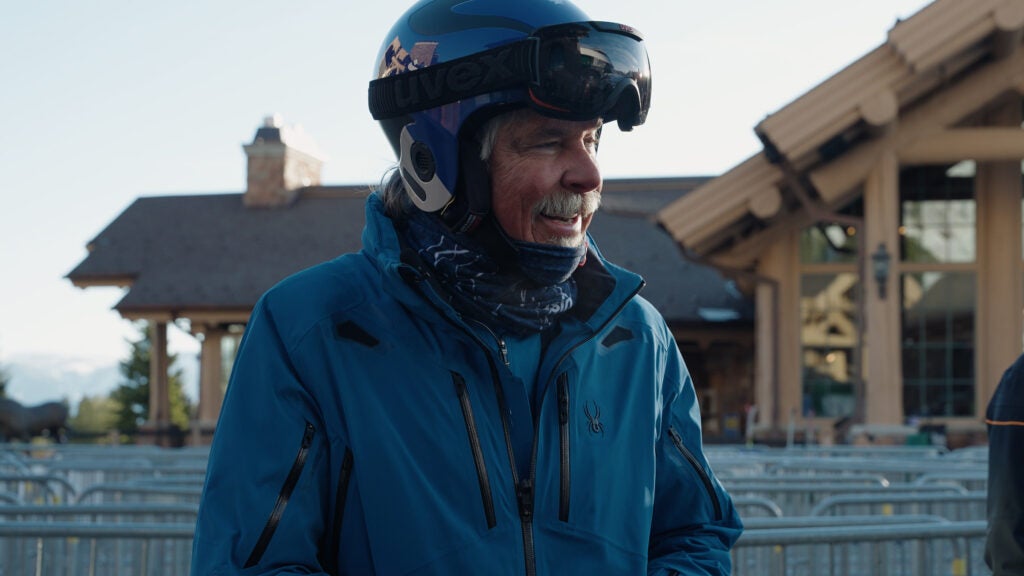No products in the cart.
Outdoor Adventure
Thomas Hart, 63, Skied 7 Million Vertical Feet in One Season
Heading out the door? Read this article on the Outside app available now on iOS devices for members!
Download the app.
The statistics from Thomas Hart’s 2023-24 ski season in Utah boggle the mind.
As of Thursday, May 16, Hart had descended 7.61 million feet on his skis since the resorts near his home in North Ogden opened back in November. That’s the equivalent of 262 Mount Everests.
And Hart, who is 63, accomplished this despite having knees that were around during the Cuban Missile Crisis.
Hart is a retired commercial real-estate agent, and he is something of a celebrity at his home resort, Snowbasin, where the locals call him “Racer Tom.” He earned the nickname because he often dons super-stuff racing skis for his days on the mountain. Over the summer, Hart came up with an ambitious plan for the coming ski season: try to surpass 6.63 million vertical feet of elevation in one season. That number represented the official Guinness World Record for men, and was set in 2019 by a Vermont man named Scott Howard, who was 65 at the time. Hart skied 170 total days, taking just one day off due to bad weather. He tried to ski 30 to 50 runs each day. Hart is in the process of submitting his GPS files and tracker data to the Guinness World Record team to verify his mark. Whether or not his numbers stand up to their scrutiny remains to be seen. But we still reached out to Hart to hear what it’s like to ski that much vert in one season.

Describe your typical ski day during the 2023-24 season.
I wake up between 4 and 5 A.M. and have an early break fast and then I’m ready to go to Snowbasin. I get to the resort at 7 A.M. even though they don’t open the lifts until 9 A.M. My friends and I get there early and we’re right in the front of the line of the main gondola. We enjoy each other’s company until the lift opens, and then I get going. Usually I leave the front side and head toward the area under beneath the Strawberry gondola. I do laps there for the first part of the day, even if it’s storming. The resort closes at 3:30 P.M., so around 3 P.M. I head to the Middle Bowl area and ski that until the end of the day. When I crunched my final numbers, I actually skied like 2.7 million vertical feet at Middle Bowl and 2.3 million on Strawberry. A lot of times I stick to the groomed runs, but on powder days I ski bumps and crud and powder.
How did get your body ready for this much skiing, and what do you do for rest and recovery?
My father always told me that the world is ruled by early risers, and I started to embrace that when I was 55. I eat dinner early and go to bed early. I drink lots of water and I try to walk everywhere. My recovery wasn’t anything specific—one day I got a massage that a friend bought for me but that was about it. But prior to ski season I spent a lot of time mountain biking with a friend of mine who is a fabulous athlete. That’s what helped me get in shape for all of this skiing. Mountain biking gets your body ready for all of that vertical. And then my style of skiing lends itself to getting a lot of vertical without wearing yourself out.
What’s your style of skiing?
I’m old school. I do longer radius turns. I choose routes that allow me to go fast, to avoid areas that have choke points or slowdowns. And I spend a lot of time trying to avoid people.
We hear lots of criticism of skiing these days—the crowds, the traffic jams, the lift lines. How did you ski that much without letting the tough parts of skiing get you down?
You have to spend time really getting to know your mountain, to know where to go during high-traffic times. It’s all about coming up with a strategy to avoid the lift lines, and sometimes that means going to lifts that you don’t think of as having too much vertical or being that fun. It’s not going to be the gondolas or the trams, but rather the smaller lifts. I go to these lifts during the high-traffic times. Because you’re going to stay moving up and skiing down, and you won’t get stopped. I know that on Saturdays there are a lot of families and kids, and I know the parts of the mountain where they go. My strategy on those days is to try and stay ahead of the crowds. Find the road less traveled. Whenever I get off a chairlift, I wait to see where the people go and I just go the other direction. I may have three or four different potential routes down, and I just steer whichever way the people aren’t going.
You skied by yourself and also with friends. How did you balance the need to go fast with sticking with a group?
The season started and I was all about the record, and then as time went on I changed my mindset. The record became secondary and I started to focus more on the fun I was having, the new people I was meeting, and the relationships I was making. Getting big vertical—like 47,000 feet a day—wasn’t that arduous of a task. My skiing friends are great. They knew that if I was on my racing skis they wouldn’t try to keep up with me, but a lot of them can ski at the same pace as me for part of the day and that worked really well. I was never put in a situation where I had to tell somebody that I needed to keep moving.
Source link

